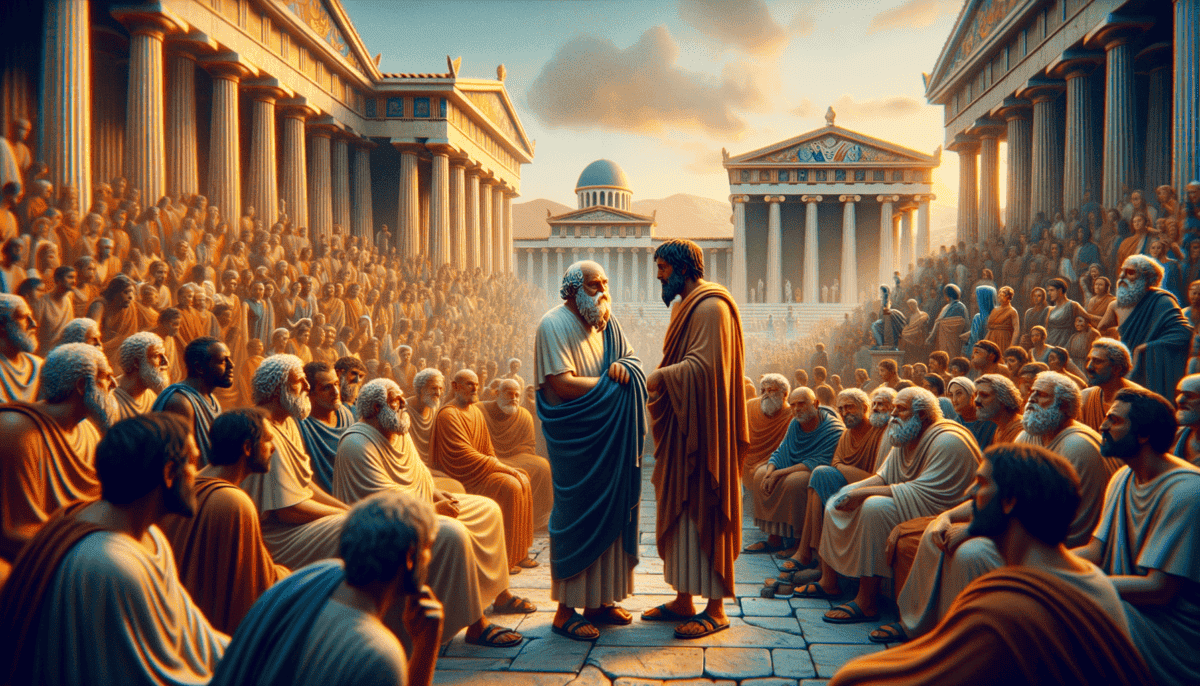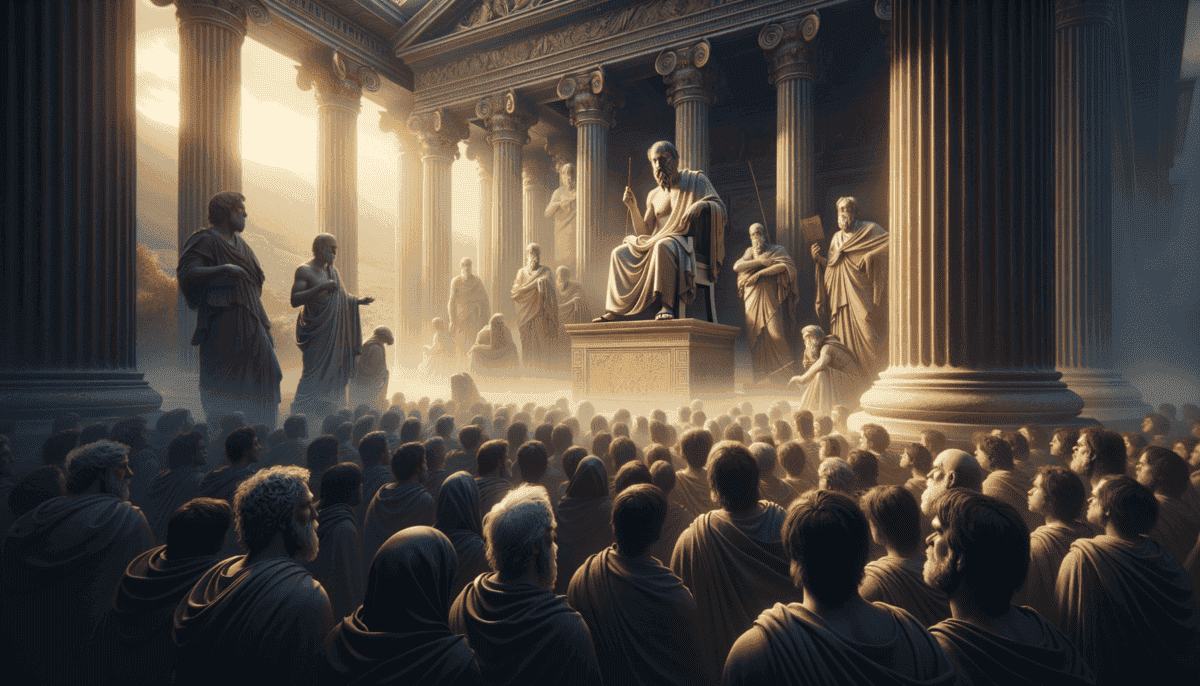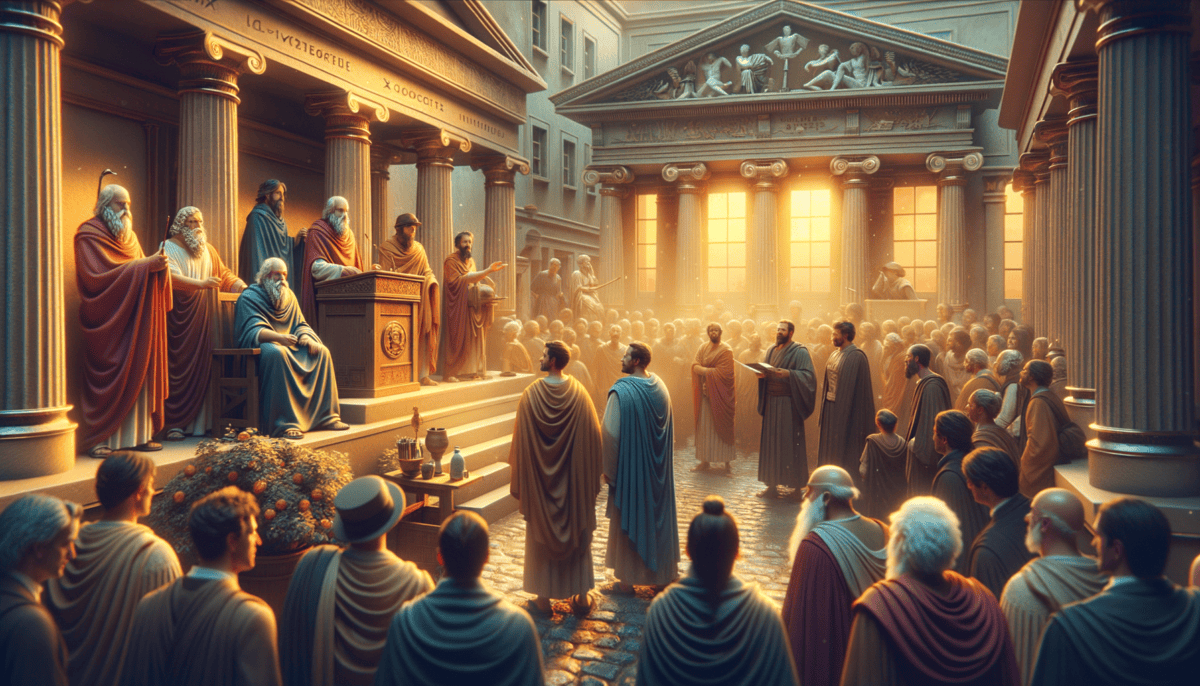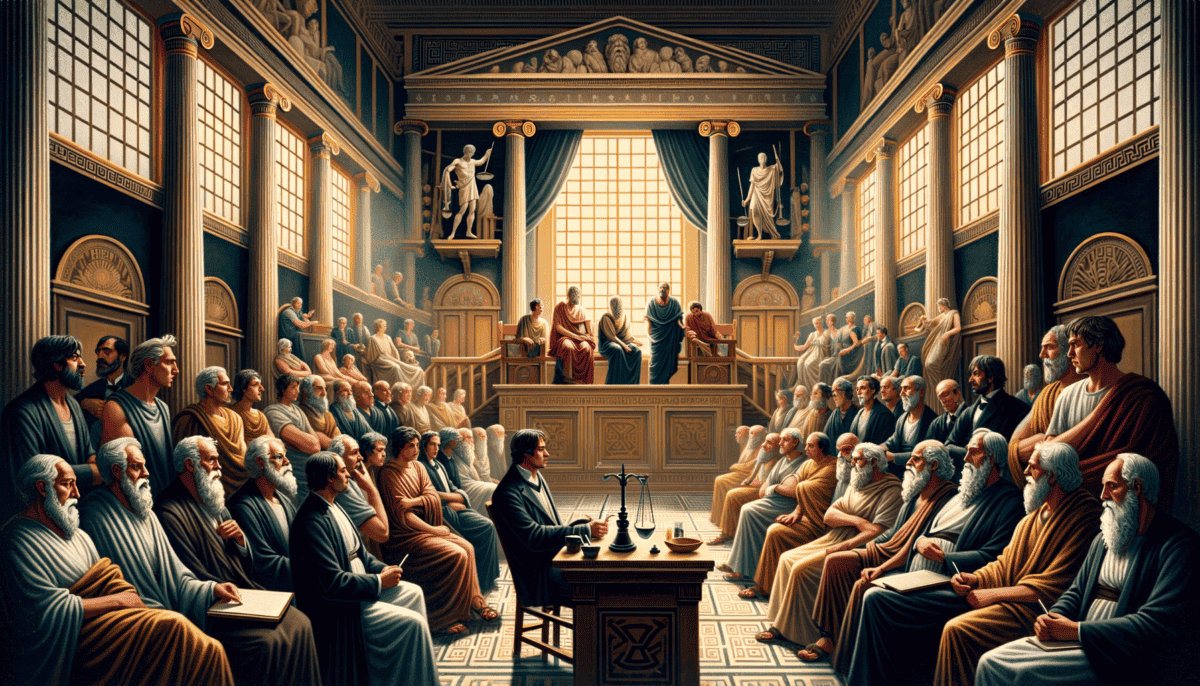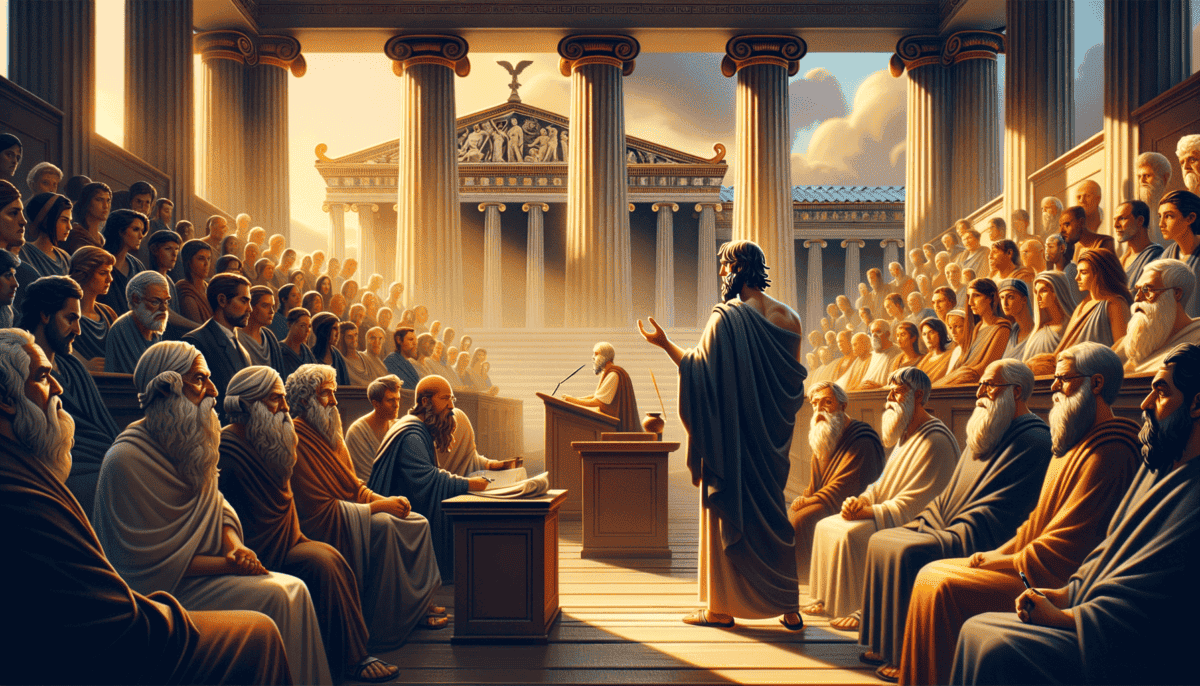The Questioner of Athens
The sun rose over ancient Athens, painting the city's white marble buildings in golden light. In the busy marketplace, a barefoot man with a funny-looking face walked slowly through the crowds. This was Socrates, and he was different from other people in Athens.
"Why do you walk barefoot, Socrates?" asked a young boy named Plato, watching his teacher with curious eyes.
Socrates smiled and scratched his bushy beard. "Well, my young friend, why do you wear sandals?"
Athens was a special city where people could vote and share their ideas. But not everyone liked how Socrates taught people to think for themselves. He would walk around the marketplace, talking to anyone who would listen – rich or poor, young or old.
"Look at that strange man," whispered some people. "He asks too many questions!"
But Socrates didn't mind what others thought. He believed asking questions was the best way to learn. When someone said they knew something, Socrates would ask:
- "How do you know that?"
- "What makes you sure?"
- "Could there be another way to think about it?"
A Different Kind of Teacher
Unlike other teachers who charged money for their lessons, Socrates taught for free. He dressed simply and lived a humble life. His wife Xanthippe sometimes got angry because he spent more time teaching than earning money.
"Dear Xanthippe," Socrates would say with a gentle smile, "isn't seeking truth more valuable than seeking gold?"
Young people loved following Socrates around. They enjoyed watching him talk to important people who thought they knew everything. When these people couldn't answer his questions, they often got red-faced and angry.
Growing Famous in Athens
Word about Socrates spread through Athens like honey dripping from a jar – slow but sweet. People started calling him the "gadfly" of Athens because, like a pesky fly that buzzes around horses to keep them awake, Socrates kept the people of Athens from getting lazy in their thinking.
"But why must you question everything?" asked an old merchant one day.
"My friend," replied Socrates, "a life without questions is like a pot without a bottom – nothing valuable can stay in it."
Young Plato wrote down many of these conversations. He saw how his teacher made people think in new ways. Some people loved this. Others did not.
As the sun set each day, Socrates would return home, his feet dusty but his mind full of new ideas. He didn't know it yet, but his way of questioning everything would soon get him into big trouble with the leaders of Athens.
The barefoot philosopher continued his daily walks, asking his questions, even as dark clouds began to gather on the horizon. His simple questions would soon shake the very foundations of Athens, leading to one of history's most famous trials.
Clouds of Trouble
The streets of Athens grew quieter as Socrates walked by. People who once smiled now whispered behind their hands. Some powerful leaders were getting very angry about his questions. ️
“Master Socrates,” said young Plato one morning, “why do some people look so angry when they see you?”
Socrates stroked his beard and smiled. “Sometimes, Plato, truth feels like rain on a sunny day – not everyone wants it.”
The Angry Leaders
One of these angry leaders was Anytus, a rich man who made leather shoes. His son loved listening to Socrates instead of learning the family business.
“That barefoot troublemaker!” Anytus would shout. “He tells our children not to respect their parents’ ways!”
But Socrates kept teaching his way. When he met important people who bragged about how smart they were, he would ask them simple questions:
- “What is goodness?”
- “What makes someone wise?”
- “How do you know what’s right?”
Growing Fear in Athens
Athens had just lost a big war with Sparta. People were scared and sad. Some blamed Socrates because two of his students had been bad leaders during the war.
“Your questions make young people doubt our gods!” shouted a priest one day.
Socrates replied calmly, “I only ask what we truly know about the gods. Is asking questions wrong?”
The Young Followers
More and more young people followed Socrates around Athens. They wore simple clothes like him and asked questions about everything. This made their parents worry.
“Look what he’s doing to our children!” parents would say. “They no longer respect our old ways!”
But the young people saw something different. They saw a teacher who helped them think for themselves.
Dark Clouds Gather
One evening, as Socrates walked home, he heard loud voices in the meeting place. Important men were talking about him.
“He must be stopped!” one shouted.
“He’s poisoning our children’s minds!” yelled another.
Plato, walking beside his teacher, looked worried. “Aren’t you scared, Socrates?”
Socrates looked at the setting sun and smiled. “My dear Plato, I’m more scared of not asking questions than of what angry men might do.”
The whole city felt like a pot about to boil over. People took sides – some for Socrates, some against him. His simple questions had started something big, something that would shake Athens to its core.
The sun set over Athens, casting long shadows across the marble streets. Socrates kept walking, kept asking his questions. But now, every question brought him closer to a day that would change everything – the day of his trial.
Storm of Accusations
The morning sun cast long shadows across the marble steps of Athens’ council building. Three men walked up those steps, carrying scrolls. They were about to do something that would change everything.
The Three Accusers
Meletus stepped forward first. He was a young poet who thought he was very smart. “Socrates makes fun of our gods!” he declared. ⚡
Next came Anytus, the angry shoemaker. “He turns our children against us!” he growled.
Last was Lycon, who spoke for other angry parents. “He teaches young people to question everything!”
The Official Charges
The charges they wrote down were simple but scary:
- Socrates does not believe in Athens’ gods
- He makes up new gods
- He makes young people bad
Socrates Hears the News
When Socrates heard about the charges, he was teaching in the marketplace. His friend Crito ran up, out of breath. ♂️
“Socrates! They’re going to put you on trial!” Crito gasped.
Everyone expected Socrates to be scared. But he just smiled and asked, “Should we not examine these charges together?”
The City Takes Sides
Soon, all of Athens was talking about the trial. Some people stood up for Socrates:
“He makes us think!” said the young people.
“He helps us be better!” said his students.
But others were against him:
“He’s dangerous!” shouted some parents.
“He doesn’t respect our ways!” yelled the priests.
Preparing for Trial
Socrates’ friends wanted to help him get ready. They offered to write speeches for him. They wanted to teach him how to make the judges feel sorry for him.
“My dear friends,” Socrates said, “should I not simply speak the truth?”
Young Plato begged him, “But Master, the truth might make them angry!”
Socrates patted Plato’s shoulder. “Then let them be angry at the truth, not at lies.”
The Night Before
The evening before the trial, Socrates sat with his friends. The city was quiet, like it was holding its breath.
“Are you worried?” asked Crito.
Socrates looked at the stars. “I worry more about doing what’s right than about what happens to me.”
His friends shared worried looks. They knew tomorrow would be a very important day. The trial would decide if Athens was a place where people could ask questions and think freely.
As darkness fell, one question hung in the air: Would Athens choose truth or comfort? Would they listen to Socrates or silence him forever?
The moon rose over Athens, its light touching the place where tomorrow, Socrates would face his accusers. The biggest test of his life was about to begin.
The Day of Judgment
The sun rose over Athens on a day that would change history forever. Hundreds of people crowded around the courthouse. They wanted to see what would happen to Socrates.
Walking to Court
Socrates walked calmly through the streets. His white beard gleamed in the morning light. His friends walked beside him, worried and quiet.
“Look how peaceful he is!” whispered people in the crowd.
“Aren’t you scared?” asked his friend Xanthippe.
Socrates smiled. “Why should I fear asking questions about truth?”
Inside the Courthouse
The courthouse was huge, with tall columns reaching to the sky. Everyone sat on stone benches. The air felt heavy and hot. ️
Meletus stood up first. His voice shook with anger:
“Socrates makes fun of our gods!”
“He teaches young people bad things!”
“He must be stopped!”
Socrates Speaks
When it was his turn, Socrates didn’t beg. He didn’t cry. Instead, he asked questions, just like always:
“If I make young people bad, why do they become better?”
“If I don’t believe in gods, why do I talk about them?”
“Should we not all try to learn and grow?”
Some judges nodded. Others frowned.
The Great Defense
Socrates told a story about his friend who went to the Oracle at Delphi. The Oracle said no one was wiser than Socrates.
“But I am not wise,” Socrates explained. “I just know that I don’t know everything. That’s why I ask questions.”
The Angry Response
Many judges got mad. They didn’t like being shown they might be wrong. They started shouting:
“Stop questioning everything!”
“Just say you’re sorry!”
“Promise to stop teaching!”
But Socrates stood tall. “I cannot stop searching for truth. It’s what makes life worth living.”
A Tense Moment
The whole room got quiet. Everyone could feel something big was about to happen.
Young Plato watched from the back, writing everything down. He knew this day would be remembered forever.
The Room Divides
The judges split into groups to vote. Some stood on one side, some on the other. They dropped small stones into jars – white for innocent, black for guilty.
Socrates watched calmly. His students held their breath. The counting began…
The court helper lifted the jars. Soon everyone would know if Athens would choose wisdom or fear, truth or silence.
The sun was setting now, painting the courthouse walls orange and red. As the final votes were counted, Athens stood at a crossroads. Would they embrace questions or silence them forever?
The Price of Truth
The counting of votes ended. The room was as quiet as a mouse. Everyone held their breath.
A Brave Face
Socrates didn’t cry. He didn’t even look sad. He stood tall, like a tree in a storm.
“What should your punishment be?” asked the head judge.
Everyone waited. Usually, people would beg for mercy. But Socrates was different.
“I think,” he said with a smile, “the city should give me free meals for life. After all, I’ve helped make Athens better by asking questions!”
The Angry Response
The judges turned red with anger. Some stood up and shouted. They thought Socrates was making fun of them.
• Stop teaching and pay a fine
• Drink poison and die
A Hard Decision
“My friends could pay the fine,” Socrates said. “They offered to help. But that would mean saying I did something wrong. I won’t lie just to save myself.”
His student Crito jumped up. “Please, teacher! Let us help you!”
Socrates shook his head. “Truth matters more than life itself.”
The Final Choice
The room got very quiet again. Everyone watched as Socrates spoke his final words to the court:
“I would rather die standing up for what I believe than live on my knees pretending to be something I’m not.”
Plato’s Tears
Young Plato cried in the corner. He wrote everything down with shaking hands.
“Don’t cry,” Socrates told him. “The truth lives on, even when people try to stop it.”
The Final Verdict
The judges huddled together. Their whispers filled the room like angry bees. Finally, they turned to face Socrates.
“The sentence is death,” they announced. “You will drink poison in one month’s time.”
A Peaceful Smile
While everyone else looked sad, Socrates smiled. He looked at the sunset through the courthouse windows.
“I am not afraid,” he said. “They can take my life, but they cannot take my truth.”
As guards led Socrates away, his students followed. They knew the next month would be their last chance to learn from their beloved teacher. The sun set on Athens, but Socrates’ spirit shined brighter than ever.
The Final Cup
The sun rose on Socrates’ last day. His small prison cell glowed with golden light.
One Last Lesson
“Why are you so calm?” asked Crito, who came to visit. His eyes were red from crying.
Socrates smiled at his friend. “Death is just another adventure. What matters is how we live.”
Friends Say Goodbye
Many friends came to see Socrates. The prison guard let them all in. He had never seen a prisoner like this before.
“Look how many people love you,” said Plato. “You could still escape. We have a plan!”
Socrates shook his head. “Running away would mean my words meant nothing. I must show that I believe what I teach.”
“It’s not just about living, but living well. And living well means doing what’s right.”
The Last Hour
When the sun started to set, a guard brought in a cup. Inside was a drink made from poison hemlock. ☠️
Everyone started crying. But Socrates picked up the cup with steady hands.
A Peaceful End
“Don’t be sad,” Socrates told his friends. “We had good talks. We searched for truth together. That’s what life is for.”
He drank the poison as calmly as if it were water. Then he walked around until his legs felt heavy.
Lying down on his bed, Socrates closed his eyes. His last words were: “Remember to live for truth.” ️
The Story Lives On
Plato wrote everything down. Because of him, we know Socrates’ story today. His ideas changed the world forever.
• Always ask questions
• Think for yourself
• Stand up for what you believe
• Truth matters more than being liked
A Light That Never Dies
Athens soon felt sorry about what they did to Socrates. They learned that killing someone for their ideas is wrong.
Today, we remember Socrates as one of the wisest teachers ever. His courage shows us that one person standing up for truth can change the world.
The sun set on ancient Athens that day, but Socrates’ light still shines. Every time someone asks “Why?” or stands up for truth, his spirit lives on. His story teaches us that ideas are stronger than any prison, and truth is more powerful than fear.


